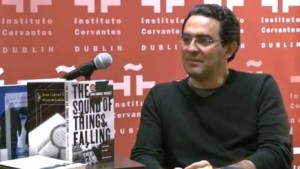Blog del Instituto Cervantes de Dublín
Torre Martello
European Summer Library
Dublin Maker 2016: European Summer Library
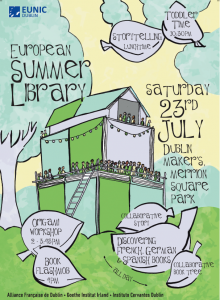
23/07
Dublin Maker Festival, Merrion Square Park, Dublin 2, 10am-6pm
¡Descubre al inventor que hay en ti durante nuestro evento European Summer Library en el Festival Dublin Maker!
Concede a tus libros una nueva vida, enseña trucos soprendentes a los niños y atrévete a crear una historia en un nuevo idioma… O simplemente disfruta, relájate y lee en el espacio que hemos decorado para la ocasión.
¡También puedes traer tu libro favorito y participar en el flash mob que realizaremos a las 4 pm!
La European Summer Library es un proyecto fruto de la colaboración entre las bibliotecas de la Alianza Francesa , el Goethe Institut y el Instituto Cervantes en Dublín (European Libraries Dublin).
Este año el festival Dublín Maker se celebrará como parte del abricante de Dublín año volverá a suceder durante el Festival of Curiosity, uno de los eventos más relevantes para la difusión de la ciencia en Dublín.
Entrada libre.
–
Unleash your inner inventor at our European pop-up library during the great Dublin Maker event!
Give your old books a new lease of life, teach a new trick or two to your toddler and create a story in a brand new language… Or just relax and read in the tastefully decorated and comfortable lounge space.
Bring a book and take part in our readers’ flash mob at 4pm!
The European Summer Library is a collaboration between the libraries of the Alliance française, Goethe Institut and Instituto Cervantes in Dublin (European Libraries Dublin).
This year Dublin Maker will again happen during the Festival of Curiosity, Dublin’s outstanding Science festival.
Admission free.
Arte y cocina española en el Instituto Cervantes / Art and Spanish Cuisine at Instituto Cervantes
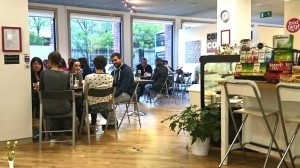 Cada vez son más nuestros amigos irlandeses (y no solo irlandeses, puesto que Dublín es muy cosmopolita) que quedan gratamente sorprendidos al visitar nuestra sala de exposiciones y encontrarse con el aliciente añadido del café Food Fiesta.
Cada vez son más nuestros amigos irlandeses (y no solo irlandeses, puesto que Dublín es muy cosmopolita) que quedan gratamente sorprendidos al visitar nuestra sala de exposiciones y encontrarse con el aliciente añadido del café Food Fiesta.
Indudablemente, disfrutar de las pinturas de Daniel Rodríguez Castro, de las que nos despedimos el día 30, o de las obras de Carlos Reguera, Blanca Gortari, Jorge Morgan y Rafael Rodulfo, en nuestro instituto a partir del 10 de junio, y poder hacerlo además en compañía de las mejores tapas españolas, es un privilegio. Un privilegio al alcance de nuestra mano gracias a Food Fiesta.
Situada en la sala de exposiciones del Instituto Cervantes, la nueva cafetería ofrece cada día más variedad gastronómica: sopa y plato del día, tortillas de patata de diferente tipo (con cebolla, pimientos, de bacalao, de chorizo etc.), bocadillos del embutido ibérico y del queso más selectos…
Food Fiesta Café es una muy buena oportunidad para beneficiarse de una sabrosa y sana dieta mediterránea, disfrutar de un buen café con un trozo de la ya famosa “tarta de Santiago”( by Vanessa Robinson), o con un bocadillo del mejor jamón serrano; recargar las pilas con unos buenos garbanzos o sentar el estómago con una sopita de calabaza. Las opciones son muchas, y tienes de lunes a sábado para dejarte sorprender.
Hay plato y ensalada del día, y todo es casero y fresco, incluida la repostería: magdalenas a base de aceite de oliva, bizcocho de naranja, galletitas y pastas de té… Ya son muchos los alumnos y profesores del Instituto que aprovechan el descanso de las clases de español para pasarse por Food Fiesta, y otros muchos clientes vienen a comer el menú del día, que Jaime Jambrina cocina cada mañana. ¿Te lo vas a perder?
Pásate, cata, y decide por ti mismo si la gastronomía española es una de las más ricas del mundo. Food Fiesta Café abre de lunes a jueves, de 9:30 a 21:30; viernes y sábados de 9:30 a 14:00.
Texto: Ángela Arambarri Ateca
Traducción al inglés: Enca González Cambil
There is an increasing number of Irish friends of the Institute (and not just Irish since Ireland is very cosmopolitan) who are pleasantly surprised when they visit our Exhibition room and find themselves allured to the charming Food Fiesta Café.
There is no doubt that enjoying Daniel Rodríguez Castro´s paintings until the 30th of May or the work by Carlos Reguera, Blanca Gortari, Jorge Morgan and Rafael Rodulfo in our Institute from the 10th of June accompanied by the best Spanish tapas is a privilege. A privilege we can enjoy at our doorstep thanks to Food Fiesta!
The new coffee shop is located in Instituto Cervantes’ Exhibition room. It offers an increasing range of dishes: scrumptious soup and menu of the day, mouth watering potato omelettes with onion, pepper, cod or chorizo to name a few and delicious Spanish salami and the best cheese rolls.
Food Fiesta Café is an excellent opportunity to enjoy a tasty and healthy Mediterranean diet, enjoy good aromatic coffee with a piece of the already famous “tarta de Santiago” (by Vanessa Robinson) or a Serrano ham roll, recharge your batteries with a hearty chickpea stew or enjoy the delightful pumpkin soup. There are plenty of options and you have Monday to Saturday to delight yourself.
There is salad and menu of the day and everything is fresh and home made, including baking: cupcakes made with olive oil, delicious orange sponge cake, tasty biscuits and pastries for your tea…The Café is packed with the Institute’s students and teachers who enjoy the delicacies of Food Fiesta during their Spanish class break. There is an increasing number of visitors who pass by and decide to stay to enjoy the menu prepared by Jaime Jambrina every morning. Don’t miss it!
Come along and try it out to decide if Spanish cuisine is one of the most delicious ones in the World! Food Fiesta Café opens its doors Monday to Thursday from 9:30 to 21:30
Text by: Ángela Arambarri Ateca
Translation: Enca González Cambil
Común / Common. Daniel Rodríguez Castro
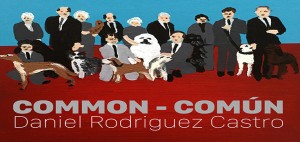 ¿Somos individuos sin el colectivo?
¿Somos individuos sin el colectivo?
Estructuras, organizaciones, masa: eso es una sociedad. Somos pequeñas partes de un todo que a menudo olvida nuestras particularidades para funcionar. Esta es la historia que cuentan las pinturas de Daniel Rodríguez Castro que podéis ver en el instituto Cervantes : empleados del mes, modelos corporativos con rostros desdibujados, parkings repletos de coches, «fotos» de grupo al lienzo (doctores, equipos deportivos, bandas de música…), vistas aéreas de parques llenos de gente, el mar con bañistas, una calle a rebosar de viandantes…
Reconocerse y reconocernos.
La colección de cuarenta obras, producidas entre 2004 y 2006, se compone en su mayoría de retratos frontales e imágenes aéreas, por las que el artista empezó a interesarse al volar por primera vez. Dice Daniel que fue en su primer vuelo, de Barcelona a Londres, cuando comenzó a fijarse en los pequeños detalles del mundo visto desde lo alto.
Clases, carreteras, edificios, aparcamientos, parques: somos muchos, somos uno.
El tema de Común, según el artista, es la identidad y el comportamiento de individuo en grupo. En efecto, a pesar de retratar multitudes consigue analizar particularidades, pequeños detalles: el modo de aparcar de un coche en un aparcamiento, la mirada más distraída de uno de los empleados del mes, la pose poder relajada de un modelo corporativo, etc.
En una pequeña visita guiada a la exposición en la que Daniel nos explicó su obra el 23 de abril, día del libro, nos comentaba, hablando de su técnica, que él trata de desvincularse cuanto puede de sus creaciones, que estas son rápidas y que disfruta más del proceso de búsqueda, de la foto perfecta que va a convertirse después en pintura (porque todas sus pinturas de grupo toman como modelo fotos originales).
En sus colecciones más recientes: Modelos corporativos y El concurso, de 2014, apreciamos rostros aún más desdibujados que en el resto de los cuadros: más que caras, nos enfrentamos a máscaras, figurantes, actores en busca de una «felicidad fotográfica».
Sin llegar a lo distópico, quizá por el empleo de colores vivos, joviales, esta exposición nos retrata como sociedad y como pequeños colectivos, llamando la atención sobre el poder de la masa, la influencia del grupo y la normalidad de actuar en conjunto, dejándonos llevar e influenciándonos mutuamente.
La pequeña reflexión que saco de esta original exposición es que el colectivo también nos hace grandes, y que es en sociedad donde nuestras voces cobran importancia. En cambio, también creo que deberíamos saber ser colectivo en todas las situaciones. Si sonreímos en fotos de familia, de equipo, en orlas; si somos un teatro lleno de espectadores y una cola gigante en la montaña rusa de un parque de atracciones; si llenamos las tiendas rastreando gangas en rebajas; si somos la ola en un partido de fútbol, también deberíamos ser esa patera con 700 inmigrantes que naufragó apenas hace una semana en las costas de Libia. Eso también era un grupo, pero sin colores, ni sonrisas, ni poder, ni esperanza; un colectivo que luchaba por encontrar una vida digna; un colectivo de individuos sin voz, apenas rostro, sin derechos.
Si queréis sacar vuestras propias reflexiones no podéis perderos Común, de Daniel Rodríguez Castro, en la sala de exposiciones de Instituto Cervantes.
Texto: Ángela Arambarri Ateca
Traducción al inglés: Enca González Cambil
Are we individuals without the collective?
Sturctures, organisations, mass: that is society. We are small parts of a whole that often forgets our individualities. This is the story told by Daniel Rodríguez Castro´s paintings at Instituto Cervantes: employees of the month, corporate models with blurred faces, car parks packed with cars, group photos (doctors, sports teams, music bands…), aerial views of parks full of people, the sea with swimmers, a street bursting with pedestrians…
Recognise oneself and recognise ourselves.
This collection is made up of 20 pieces produced between 2004 and 2006. Most of them are portraits and aerial views that the artist became interested in when he flew for the first time. It was during his first flight from Barcelona to London when he noticed the little details of the world as seen from above.
Classes, roads, buildings and car parks, parks: we are many, we are one.
The theme of ‘Common’, according to the artist, is identity and the individual’s behaviour within a group.
During his exhibition tour on the 23rd April, World Book Day, Daniel explained that he tries to distance himself from his creations. They are completed within a short timeframe but he enjoys the research process most, the perfect photo that will become a painting, since all his group paintings are modelled on original photos.
In his most recent collections: ‘Corporate models’ and ‘The Contest’ (2014), we can see faces that are more blurred than in the rest of his paintings: rather than faces we see masks, figurines, actors in search of ‘photographic bliss’.
This exhibition does not present a dystopian society, perhaps due to the use of vibrant and joyful colours. It portrays us as a society and as small collectives, drawing attention to mass power, group influence, the normality of acting as a group, letting us be led and mutually influencing each other.
My reflection of this original exhibition is that collectiveness also makes us big and that it is within a society that our voices become important. However, I also believe that we should know how to become a collective in all situations. If we smile in group, team or college photos, if we are a theatre full of spectators and a huge queue on the roller coaster, if we fill up shops searching for sales, if we are a wave at a soccer match, we should also become that boat with 700 migrants that sunk just over a week ago on the Libyan coast. This was a group as well, but a group without colours, without smiles, without power, without hope, a collective who fought for a decent life, a collective without voice, almost without a face, without rights.
If you wish to draw your own conclusions, don´t miss ‘Common´by Daniel Rodríguez Castro at Instituto Cervantes Dublin Exhibition room.
Text by: Ángela Arambarri Ateca
Translated by: Enca González Cambil
Vuela a España con el Instituto y con Iberia Express / Fly to Spain with Instituto Cervantes and Iberia Express
 Ahora, si estudias en el Instituto Cervantes, ¡puedes ganar un vuelo a España! ¿Sabes por qué? Porque el Instituto Cervantes e Iberia Express (http://iberiaexpress.com) acaban de firmar un convenio de colaboración mediante el que la compañía aérea pondrá a disposición del Instituto billetes de ida y vuelta a España para sortear entre sus alumnos.
Ahora, si estudias en el Instituto Cervantes, ¡puedes ganar un vuelo a España! ¿Sabes por qué? Porque el Instituto Cervantes e Iberia Express (http://iberiaexpress.com) acaban de firmar un convenio de colaboración mediante el que la compañía aérea pondrá a disposición del Instituto billetes de ida y vuelta a España para sortear entre sus alumnos.
Pero las buenas noticias no acaban aquí: además, todos los alumnos del Instituto Cervantes, así como los usuarios de la biblioteca, contarán con un diez por ciento de descuento en la compra de billetes con Iberia Express.
Los sorteos de billetes se llevarán a cabo a lo largo de los próximos meses y la información sobre cómo participar en ellos se publicará en la página electrónica de nuestro instituto. ¡No dejes de visitar el blog y la página de Facebook para mantenete al corriente!
Otra forma de ganar un viaje a España, gracias también al acuerdo con Iberia Express, será sacando al escritor que llevas dentro en el concurso de mini-relato que cada año se celebra en el Instituto Cervantes con motivo del Día del libro. Los relatos premiados se publicarán en el blog del Instituto, y sus autores podrán viajar a España a continuar practicando su español de la mejor forma: pidiendo unas tapas en el sur, unos pinchos en el norte, disfrutando de la oferta cultural madrileña…
También podrán beneficiarse de estos premios los participantes en alguna de las muchas actividades que organiza el Instituto durante el Día del Español. ¿Será este año un concurso de tortilla?, ¿un karaoke? Ya veremos. En todo caso, será una oportunidad única para descubrir nuevos talentos entre nuestros estudiantes y, desde luego, pasar un buen rato. Eso sí, seguro que este año la competencia será mayor, ahora que está en juego un viaje con Iberia a la península del sol.
Matricúlate y participa en el sorteo con Iberia Express [PDF].
Texto: Ángela Arambarri Ateca
If you are studying at Instituto Cervantes you can win a flight to Spain! Do you know why? Because Instituto Cervantes and Iberia Express (http://www.iberiaexpress.com) have just signed an agreement whereby the airline will provide the Institute with return flights to Spain to raffle amongst students.
Still more good news to come! Instituto Cervantes’ students and library members can avail of a 10 per cent discount on Iberia Express ticket fares.
Ticket raffles will take place in the next few months. Information on how to participate will be published on the Instituto’s website. Check our blog and Facebook site for regular updates!
Under the same agreement with Iberia express you can also win a trip to Spain by participating in the Short stories competition taking place during Instituto Cervantes annual celebration of World Book and Copyright Day. Come on and join the competition to release the budding writer within yourself!
The winning stories will be posted to our blog and their authors will have the opportunity to travel to Spain to continue practising their Spanish in the best context: ordering tapas in the South, pintxos in the North and enjoying Madrid cultural offer amongst other activities.
You will also have the opportunity to win this prize by taking part in any of the many events the Instituto organises during the celebration of the Día E (The day of the Spanish language). Will there be an omelette competition or a karaoke this year? The best is yet to come! It will certainly be a unique opportunity to discover new talents amongst our students and have lots of fun.
Competition will definitely increase this year in the fight for a flight with Iberia to the Sun Peninsula
Enrol in a Spanish course and participate in our Iberia Express raffle! [PDF].
Text: Ángela Arambarri Ateca
Diario de un poeta recién casado / Diary of a Newlywed Poet
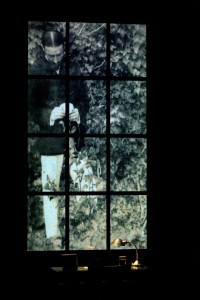 Diario de un poeta recién casado es «una breve guía de amor por tierra, mar y cielo» escrito por el premio Nobel de literatura Juan Ramón Jiménez durante su primer viaje a Nueva York. Este viaje iniciático lo reúne con su musa, Zenobia Camprubí, quien pronto se convertirá en su mujer a pesar de haber rechazado en otras ocasiones las propuestas amorosas del poeta.
Diario de un poeta recién casado es «una breve guía de amor por tierra, mar y cielo» escrito por el premio Nobel de literatura Juan Ramón Jiménez durante su primer viaje a Nueva York. Este viaje iniciático lo reúne con su musa, Zenobia Camprubí, quien pronto se convertirá en su mujer a pesar de haber rechazado en otras ocasiones las propuestas amorosas del poeta.
Juan Ramón Jiménez inaugura con esta obra un mundo nuevo de posibilidades para el verso libre en español, y construye el ritmo de sus poemas inspirándose en los movimientos del mar.
Este Diario es un espectáculo organizado en colaboración con la compañía Teatro de la Abadía, dirigido por el conocido y multipremiado actor José Luis Gómez. En él, «Gómez encarna a un Juan Ramón aislado y solitario, viviendo la cadencia de su verso y la naturaleza única e íntima de cada palabra. Y, sin embargo, todo, el patio de butacas, las paredes del teatro, todo hasta el infinito / se colma de una esencia / inmensa y viva».
El espectáculo tendrá lugar en el histórico Smock Alley Theatre (Boys School). Una ocasión única para aproximarse al texto original en la voz de uno de los mejores actores de la escena teatral española. Una representación que se incluye en las celebraciones del mes de Juan Ramón en el Instituto Cervantes de Dublín, en el que conmemoramos el centenario de la primera publicación de Platero y yo, la obra más universal de Juan Ramón y el texto en español más traducido a nivel mundial después de El Quijote, de Miguel de Cervantes.
¿Dónde? Smock Alley Theatre, Exchange Street Lwr, Temple Bar, Dublin 2
¿Cuándo? El 5 de noviembre a las 7 de la tarde.
Entrada libre hasta cubrir aforo.
Reservas en: reservas.dublin@cervantes.es
Espectáculo en español con sobretítulos en inglés.
Organised by: Instituto Cervantes Dublin in collaboration with Teatro de la Abadía (Madrid)
Nota de prensa de Miriam Abuin (prendub@cervantes.es)
Diary of a Newlywed Poet is “a guidebook to love through the land, the sea and the sky”. Nobel Prize winner Juan Ramón Jiménez writes during his first trip to New York. This initiation journey reunites him with Zenobia Camprubí, soon to become his wife, but who had refused to accept his attentions and courtship in various occasions.
Juan Ramón Jiménez inaugurates with his work a world of possibilities for the free verse in Spanish, and constructs the rhythm in his poems inspired by the movements of the sea.
Diary… is a show organised in collaboration with the prominent theatre company, Teatro de La Abadía, led by renowned actor and director José Luis Gómez. “Gómez incarnates a solitary and isolated Juan Ramón, living on the cadence of his verse and the unique and intimate nature of his words. But, surprisingly enough, everything, the stall, the theatre walls, everything, even the infinite / becomes suffused with an immense / and living essence”. The show will take place in the historic Smock Alley Theatre (Boys School).
This is an exceptional occasion to enjoy and approach the original text in the voice of one of the best actors from the current Spanish theatre scene. Diary… is included in Juan Ramón Jiménez´s Month, a series of events prepared by Instituto Cervantes for the month of November to commemorate the centenary of the first publication of Platero y yo, Juan Ramón Jiménez’s universal work and most translated text from Spanish after Don Quixote.
Location: Smock Alley Theatre, Exchange Street Lwr, Temple Bar, Dublin 2
Date: 5th November
Time: 7pm
Free Admission but limited places available.
Please book your ticket at reservas.dublin@cervantes.es
Languages: Spanish with English surtitles.
Organised by: Instituto Cervantes Dublin in collaboration with Teatro de la Abadía (Madrid)
Press release by: Miriam Abuin (prendub@cervantes.es)
Espacio femenino / Female Voices in Spanish Cinema
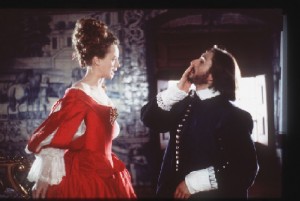 Abrimos hoy en nuestro instituto el ciclo de cine dedicado a obras fundamentales de la cinematografía española realizado por mujeres.
Abrimos hoy en nuestro instituto el ciclo de cine dedicado a obras fundamentales de la cinematografía española realizado por mujeres.
Este ciclo comienza con El perro del hortelano (The Dog in the Manger, dirigida por Pilar Miró en 1996), una maravillosa adaptación de la obra de Lope de Vega que fue además la última película realizada por esta directora.
El perro del hortelano recibió numerosos premios y fue muy bien recibida tanto por la crítica como por el público en general. Toda la película, en la que Emma Suárez y Carmelo Gómez nos ofrecen unas soberbias actuaciones, llenas de naturalidad y gracia, está recitada en el verso original de esta comedia barroca. Localizaciones como la del Palacio de los Marqueses de Fronteira (en Lisboa, Portugal) y el cuidadoso diseño del vestuario, son otros de sus atractivos.
El ciclo Espacio femenino continuará el miércoles siguiente con la proyección de Te doy mis ojos (2003), de la ya consagrada directora Icíar Bollaín. Te doy mis ojos es uno de los títulos fundamentales del cine español reciente y uno de los primeros en afrontar el delicado tema de la violencia doméstica. La fuerza con que la historia que se nos cuenta nos atrapa se debe, en buena medida, a las magistrales actuaciones de Laia Marull y Luis Tosar, su pareja protagonista.
Por su parte, Héctor, de Gracia Querejeta, nos acerca a la vida privada de sus personajes y a los cambios que experimenta la vida del joven Héctor. Tras la muerte de su madre, se traslada desde una zona acomodada de la ciudad hacia las afueras de Madrid con su tía, quien lo cuidará a partir de ese momento.
También son personajes jóvenes y de clase media alta las chicas protagonistas de Blog, de Elena Trapé, la última de las películas de nuestro ciclo. Trapé nos ofrece un tipo de cine apoyado en actuaciones improvisadas y grabadas con cámara al hombro. Elena Trapé consigue retratar las vidas de estas quinceañeras que necesitan sentirse parte de un grupo sin caer en puntos de vista demagógicos o sensacionalistas. Como todas las otras películas del ciclo, altamente recomendable.
¿Dónde? Instituto Cervantes, Lincoln House, Lincoln Place, Dublin 2
¿Cuándo? 15, 22, 30 de octubre, y 6 de noviembre
¿A qué hora? A las 6 de la tarde
Entrada libre
En español con subtítulos en inglés
Texto del artículo: Miriam Abuin (prensa.dublin@cervantes.es)
Instituto Cervantes continues the cinema season with the essential works of female Spanish directors. The series starts with El perro del hortelano (The Dog in the Manger, Pilar Miró, 1996), a wonderful adaptation and the last movie by Miró.
El perro del hortelano gathered numerous awards and the acclaim of critics and public at its release. It is a remarkable adaptation of Lope de Vega’s comedy, brought to screen in verse. Miró’s movie is part of Spain’s recent classics in which Emma Suárez and Carmelo Gómez delivered extremely natural performances in spite of working with a very faithful script to the original text of this Baroque comedy. Locations such as the Palace of the Marquesses of Fronteira (Lisbon, Portugal) and the exquisite costume design would delight the audience.
Female Space will continue with the drama Te doy mis ojos (2003) by renowned director Iciar Bollaín. Bollaín’s work is an indispensable title of recent Spanish cinema, and one of the first movies to address the delicate matter of domestic violence. The impact of the story owes also a big deal of credit to the performances of Laia Marull and Luis Tosar (Cell 211, 2009) as the protagonist couple.
Gracia Querejeta’s Héctor looks into the private lives of its characters but also shows the scenery change for young Héctor. After his mum’s death, he moves from an accommodated setting to a blue-collar suburb in Madrid with his aunt, who offers to take care of him.
Young characters and upper-middle-class girls are the motor of Elena Trapé’s Blog. Trapé’s title, based in the Gloucester teen pregnancy controversy, offers a type of cinema supported by improvised performances and shoulder-held camera filming. Trapé portraits the lives of teenage girls with the need to feel part of a group without falling in a sensationalist view of the story.
Location: Instituto Cervantes, Lincoln House, Lincoln Place, Dublin 2
Date: 15th, 22nd, 30th October and 6th November
Time: 6pm
Free Admission
Languages: Spanish with English subtitles
Text writen by Miriam Abuin (prensa.dublin@cervantes.es)
Juan Gabriel Vásquez, Premio IMPAC 2014. ¡Felicidades! / Congratulations!
Juan Gabriel Vásquez: Write Only if You Think That you will Be Unhappy Otherwise
Interview with Juan Gabriel Vásquez on the 14th November 2012, at the Dámaso Alonso Library of the Instituto Cervantes in Dublin, in association with his participation in the launch of his lastest novel, The Sound of Things Falling.
Juan Gabriel Vásquez (Bogotá, 1973) is the author of a collection of stories, Los amantes de Todos los Santos, and the novels Los informantes (The Informers, Riverhead Books, 2009) and Historia secreta de Costaguana (The Secret History of Costaguana, Riverhead Books, 2011). He has also published a collection of literary essays, El arte de la distorsión (which include an essay that won the Simón Bolívar Award in 2007), and a brief biography of Joseph Conrad, El hombre de ninguna parte. He has translated works by John Hersey, John Dos Passos, Victor Hugo and E. M. Forster, amongst others, and is a columnist for the Colombian newspaper El Espectador. His books have been published in fourteen languages and thirty countries. His third novel, El ruido de las cosas al caer, (The Sound of Things Falling, Bloomsbury, 2012) won the Alfaguara Award in 2011.
Sergio Angulo: —Juan Gabriel, The Sound of Things Falling is your latest novel, tell us about it.
Juan Gabriel Vásquez: —The novel is the story of this young law professor called Antonio Yammara, who one day meets this mysterious character, a guy called Ricardo Laverde, who evidently has something to hide and is not who he says he is. What begins as this frivolous curiosity, turns into something more serious when this Ricardo Laverde gets killed by a sniper in the street, by a hit-man. The narrator gets hit by a bullet, a straight shot that obviously changes his life. He becomes obsessed with finding out who this guy really was and why he was killed, in order to reach some conclusions about what has happened to him and why his life has changed. So he embarks on this personal investigation, a personal enquiry into the life of a dead man and his past of Colombia. This sends him back to the years in which the drug trade effectively began in Colombia, the early seventies.
We learn that this guy was a pilot and he was not only a witness, but also a participant in the first phase of the drug trade. The novel becomes a sort of exploration of what it means to my generation to grow up surrounded by the drug trade, and particularly, what it means for us to have suffered through the worst years of drug-related violence – of the drug wars in the eighties, when Pablo Escobar basically declared war against the Colombian Government. This is what I have tried to explore.
Sergio Angulo: —The story is not a real case, but it somehow, portrays the reality of this era in Colombia.
Juan Gabriel Vásquez: —It’s a work of fiction, but I tried to explore things that really happened. One of my obsessions has been, not only in this novel, but in my other novels too, how public events shape our private lives. This is one of the things that interests me as a novelist – how things that happened in what we call “history” or “politics” penetrate our lives and affect the way we behave as friends, or as couples, or as parents and children.
One of the reasons behind the writing of this novel was to realise that, in those years, during that period of violence, we had a lot of public information, we had a lot of statistics, a lot of images in the media, (we can even find the video of a presidential candidate in Colombia getting killed) but, at some point, I became anxious at the idea that there wasn’t a place we could go to find out about the effects all of this had had on private or personal lives. In a way, the novelist I wanted to be, is a sort of historian of emotions. I tried to explore the emotional and moral side of those very public events.
Sergio Angulo: —You were living in France for a while and, as far as I know, you are now based in Spain, in Barcelona. Has this distance had any effect on the way you see Colombia now?
Juan Gabriel Vásquez: —It’s very difficult to prove, but I’ve always said that, the only reason I´m able to write about Colombia, is because I have left. My first book was a book of stories about Belgium and France, and people used to ask me, “Why don’t you write about Colombia?” And the reason, to sum it up in a nutshell, is that I felt that, since I didn’t really understand my country, I wasn’t allowed to write about it. But because of the distance, because of the time I spent abroad, and because there was an ocean between my country and me, I ended up realising that, perhaps the fact that I didn’t understand my country was the best reason to write about it. I could use novels as a way of understanding the history of my country and how that has shaped me as an individual.
Sergio Angulo: — Historically, Barcelona is a place where many of the most important Latin American authors have lived. Now we are celebrating the 50th anniversary of the Latin American literary boom. Is this literary boom still happening, or has there been a turning point with new generations taking different paths?
Juan Gabriel Vásquez: —I always considered the writers of the Latin American boom as the real founders of my tradition. The tradition in which I tried to write began with them. Before them, the Latin American novel had maybe produced a couple of isolated things, very interesting things, but isolated. There wasn’t a tradition of Latin American novels to speak of. It all began with Vargas Llosa, García Márquez, Carlos Fuentes and Julio Cortázar. So, in a way, they’re quite present for me, in the sense that they are all still living. Vargas Llosa and García Márquez are still living. Vargas Llosa is still writing. But, at the same time, they are classics. They are living classics, and for me, having them sharing the same world, is almost as if a 21st Century Irish writer could pick up the phone and call James Joyce. It’s a very strange situation, and a very profitable one. I don’t feel in any way threatened by their presence, as many writers do. I feel there is a very big legacy that has opened doors for the people who have come after them.
Sergio Angulo: —Living in Europe, is our perception of Latin America accurate?
Juan Gabriel Vásquez: —There is always a certain degree of inacuracy. But it works both ways. The media have an extraordinary ability to distort the image of a country, sometimes through no fault of their own, because time in the media is limited, resources in the media are limited… But one of the nice things that novels do is, in a way, fight against cliché, against stereotypes, so perhaps we, as readers, get a much better understanding about the complexity of the United States, when we read Philip Roth. Maybe an Irish reader, or a British reader, will get a better understanding about Colombia and the complexity of life there, the contradictions, the unpredictability of life in Colombia, when they read a novel such as this one. In any case, that’s what I would like to see happening.
Sergio Angulo: —You are very young, but you are already at the peak of the literary world. How is the view when looking down?
Juan Gabriel Vásquez: —In reality, I’m looking towards the next book, and wondering how difficult it will be to write it, because one of the cruel things of this trade is that every book is more difficult than the last one, in the sense that you know more things, you’re more conscious of the pitfalls and the problems, and the difficulties of writing. You don’t want to repeat yourself. I’m one of those writers who wants to change with every book. You always get deeper and deeper into this arrogant mindset that you can write a book like the books you love. And I think that’s what you constantly strive to do. You never get to do it, of course, because it’s impossible to write a book like those books that made me want to become a writer. But I think in the attempt to accomplish this, you might give the reader a couple of nice pages, and that’s probably enough.
Sergio Angulo: —Finally, any advice for a young writer who is at the bottom of the hill, getting his book and his backpack ready to start climbing the mountain?
Juan Gabriel Vásquez: —Well, I always give the same piece of advice, which is very simple but very honest, and I think it’s very useful, – Write only if you feel it’s absolutely necessary. The writing life is a very difficult life to live. You have to sacrifice friends, you have to sacrifice time with your family, so write only if you think that you will be unhappy if you don’t do it. Forget about the money, the reviews… they don’t matter. Write only if you know that your only reward will be the satisfaction of a job well done.
Recommended links
- [Video] Interview with Juan Gabriel Vásquez at the Instituto Cervantes in Dublin by Sergio Angulo.
- Juan Gabriel Vásquez in El Espectador.
- Juan Gabriel Vásquez in Alfaguara.
John Banville, Premio Príncipe de Asturias de las Letras / Prince of Asturias Award for Literature
Transcripción de la entrevista / Interview’s transcription
David Smith: Good afternoon, continuing our interviews for the Isla Festival here, in the Cervantes Institute we are with the acclaimed Irish novelist and critic John Banville. John, you are very welcome here to the institute this afternoon
John Banville: Thank you
David Smith: You opened the Festival yesterday you gave a wonderful speech one of the images that you invoked in the speech is a memory that you had your first visit, to Spain. A man on a horse, such a clear Quixotic reference, such a clear Cervantes reference.
John Banville: Cliché is the word that you are looking for.
David Smith: I did like that you mentioned that you didn’t know whether it was a black horse with a white background, or vice versa..How do you see the image of Don Quijote as it travels through…
John Banville: Sancho Panza is my hero, I don’t care much for Don Quijote. Sancho Panza is wonderful. I mean he is every man, he is every man trailing behind a mad dreamer, you know. The world is full of us. And of course it´s, you know, it really is the first novel, I suppose. You could go back to Latin
times but I think Quijote is the first great work of fiction in certainly in the modern era.
David Smith: Joyce says,whimsically that it’s the first book that´s a little bit about itself.
John Banville:Yes that’s true I hadn’t heard that but yes that is true it is self-conscious, it is aware it is self-referential. I suppose it’s more modern than it seems in that aspect.
David Smith: Do you see it as a book that will continuously submit itself to the prevailing literary theories?
John Banville: Well I mean, I don’t know. When I was young I was a great one for theory but the older one gets the more theories fall away. You know, the academies must be supplied, they must keep working… Comparative literature… but the thing about Cervantes is that you know, it’s great popular
literature. Now, Nabokoff hated Don Quijote, he said, you know, only people who find people being sick in each others faces will find this book funny and to a certain extent I agree with him. There´s a raucousness about it that I’m not quite convinced by… So here I am in the Cervantes Institute criticizing Cervantes. Typical!
David Smith: As Don Quixote would do himself. And your prose, interesting that you mention Nabokoff here compares to that confessional narrative famous of Vladimir Nábokoff. Your prose which has this extremely rich poetic element, one of the elements that was discussed yesterday in the roundtable
the boundaries between poetry and prose to see those two territories as territories that cross over?
John Banville: Well my old friend John McGahern used to make a nice distinction. He said that ”There’s
verse, and there’s prose and then there’s poetry.” And poetry can happen in either medium. And I agree with him. One has to be very careful. Irish writers are in love with language, we roll in it like a pig rolling in mud. You know, flinging it in the air. So we have to be careful, we have to apply self-discipline. But I do try to make my books as demanding as a poem. W.H. Auden said that ”The poem is the only work of art that you either take or leave.” You know you look at a picture and your mind can wander to think what you going to have for dinner, you can listen to a symphony and think about your girlfriend or something but a poem you either read it or you don’t. And I try to make my prose the same level of density and I want to make it as demanding as poetry This puts a lot of people off by the way.
David Smith: Interesting. And Octavio Paz, by the way, the great Mexican poet has a very clear distinction
he says ”Poetry inspires,” It’s beautiful in Spanish, this is a shoddy translation that I’m doing. He says that ”Prose aspires to say something whereas poetry aspires to be something.”
John Banville: Yes, well I won’t try to blur that distinction my books you know, you don’t read them for the plot. If you do you’ll be greatly disappointed. You don’t read into the characters you
don’t read them for dialogue, there’s very little dialogue. You read them for something else, you read them for an intensification. I see my book says, like all works of art, as quickening the sense of life, the sense of being alive giving you an intensified sense of what it is to be human that’s when I aspire to do and I see no distinction between prose and poetry and that aspiration.
David Smith: When I heard I had this opportunity, I went digging through old books of yours that I haven’t read in years. I have underlined one line in particular that always struckme as a difficult line, from ‘Shroud’ ”I used piously to hope that they would not have suffered” He’s talking about his mother and his father ”But since then I’ve learnt about hope.”That always affected me, I always wonder whether that was a difficult line for you to write? Do you find yourself-ah?
John Banville: Oh, no I’m not involved in ita I’m not there it’s it’s entirely impersonal. The notion that writing is self-expression is a false notion. And when I stand up from my desk and I
finish my day’s work the person who did the writing ceases to exist. This is why when I meet admirers of my work at readings, they always see this, you know you can always see this disappointment only in their eyes I want to say to them the point is, you like the books, but I have nothing to do with the books. The person you are talking to has nothing to do with it. He sits at the desk and does the work. But when he stops he ceases to exist. This is a difficult concept because people imagine, especially people who aspire to be writers that they are themselves going to have an intensified sense of being alive. It doesn’t work that way. My writing doesn’t work for me.
David Smith: Have you done this through discipline or is that idea, not one John Banville but a multiplicity…
John Banville: Oh I think any any artist would have the same sense of disembodiment and Elliott himself said you know that ‘The man who suffers is not the artist to create immense suffering,’ in the general sense of course, being Elliot it’s got to be suffering but you know, I firmly believe that that’s something else happens. Time becomes strange when you’re working. I always give the example I was writing
one day years ago, my wife put her head in the door of my study and said ‘I’m going to the shops’ a moment later she put her head in again, I said ‘I thought you were going to the shops? She had been to the shops! And I had no sense that of that time that space having past, there’s nothing on the page even,So where was I in that period? And that’s the point of the kind of prose that I write, it’s extreme concentration. I concentrate. You know, mornings will pass by and I won’t write anything, I’mjust sitting there,you know, and I sink deeper and deeper and deeper into myself Or I lose myself- I’m lost in myself so that by three or four in the afternoon, when I’m really working John Banville ceases to exist.There’s somebody
else there doing this. I discover I use words that I don’t even know the meaning of. I’ll look them up and discovered that they’re the right words. And that happens increasingly nowadays My workaday memory is fading because I’m getting old, but my store of words is intact. The day that I can’t drag up a word from that store, I’ll know that I’m finished.
David Smith: Characters in your book seem to be based on real, on historical figures. What obligation to history do you feel as a writer when you create a character?
John Banville: Absolutely none. Zero. Novelists, artists, are cannibals. We will eat our own children to make a line, to make a corner of a painting or to make a piece of music. We are completely ruthless. But then again, as I say the citizen who goes in to my study and sits down ceases to exist, when I start writing. The artist is completely amoral. I have no interest in politics, the person who writes has no interest in politics, society, in morals, family anything except getting this done. It’s a completely ruthless process, and anybody who tell you otherwise is lying, or is a fool.
David Smith: I see you about town, time to time. Dublin. And my friend always comments on ‘John Banville, the great wearer of hats. ‘I wonder..forgive me for asking such a whimsical question. Somebody who’s so involved, who wrangles with notions of identity, notions of consciousness, are you- I love your shoes the way. Are you conscious of style? Do you follow fashion?
John Banville: No, I like shoes, I like hats, I’m human you know but.. No I’m not, I’m not. I mean, look at me, this is hardly fashionable.
David Smith: It’s autumnal.
John Banville: I’m always autumnal. High summer, I’m autumnal. This is my season, this is the season I love, this is when Ireland comes into it’s absolute best. I love the climate here anyway I could’nt live anywhere else. The only city that I’ve ever been in that I thought looked anything like Dublin and in terms of light, is Copenhagen. It has that silvery melancholy light at all times of the year. Very very beautiful.
David Smith: Style in your work, are you conscious of a signature? That certainly the world is
aware of.
John Banville: No. For the most part I don’t know what I’m doing. I work in the darkness. I work in a personal darkness. I don’t know where I’m going or what I’m doing. I work by the sentence. Each sentence makes the next sentence and that sentence makes the next one. And I work on the principle that, if you look after the what is the phrase..If you look after the pennies, the pounds will look after themselves.If you look after the sentence then the book will get done eventually by itself, in some strange mysterious way that I don’t understand. When I was young I was very much, I thought that I was very much in control of everything You know, when I started a book I knew what the last line was going to be.. But as I got older, I allowed instinct to work. And also you know you imagine that with age will come wisdom. It doesn’t. all that comes with age is confusion. But confusion is good state for an artist to be in. Not knowing is better. I was always puzzled by I think that Elliott said, that T.S. Eliot said that the artist, it’s no business of the artist to think. I was always puzzled by this, and I still am to
a certain extent. I do see what he means, that you have to work by instinct, you have to work by passion.
But I am infected with the Bacillus of thinking. Thinking I like books where I can see evidence of a mind at work and I like my own books to be that as well. But it’s very difficult get thought into fiction. Difficult to get thought into art. I discovered that when I was writing my books on Copernicus and Kepler to put actual science into fiction, they just don’t fit together. They really do not fit.
David Smith: In terms of how people describe your work, Do you have a preferred adjective?
John Banville:Oh I don’t know because I don’t read reviews. I don’t read anything about myself so I don’t know what they say.
David Smith: Banvillian.
John Banville: Oh that’s nice, I’ll get into the Oxford Dictionary for you, probably.
David Smith: And my last questions, John, the quote that I took from ‘Shroud’ refers I think to the Nietzschean quote that you introduced the book with. The words themselves and just the words
that Nietzsche chooses in this case is, ‘I do suffer.’ That ´´words in general perhaps are on the horizons of our knowledge but not truths.´´ Is this what drives you, is this tendency towards a horizon? As I say, you get older you perhaps realise that things are more in the dark but that you
tend towards a horizon of meaning.
John Banville: That’s a good question. I strive to get to make my sentences as close to perfection as I can. I will never get perfection, you know, all works of art are failures. By necessity. Because they set
out to be perfect and perfection is not given to us. But that’s about the limit of what I do now, I try to make the sentences as good, and as rich and as poetic and as elusive as I can. And the rest takes care of itself, so. You know, in the early books, especially in the Copernicus and Kepler books, a long time ago. The strive towards knowledge, towards cognition is very evident in those books but since then, my writing career, such as it is, has been a flight from meaning, a flight from thought, a flight from cognition, into something else that I haven’t got a name for. Maybe that’s what I’m trying to do, maybe I’m trying to define what it is I’m trying to define.
David Smith: John thank you very much for joining us this
afternoon, I hope you enjoy the rest of the festival.
John Banville: Thank you.
La guitarra española de la mano de Ángel Lejarza y Salvador Andrades / The Spanish Guitar
El sonido de la guitarra siempre ha estado muy presente en el Instituto Cervantes de Dublín. Buena prueba de ello han sido los conciertos de Salvador Andrades, Alan Grundy, Ángel Lejarza, Juan José Manzano y Damià Timoner, celebrados durante el último año y medio en nuestro Café literario. A ellos se añaden talleres como el que estos días imparte en nuestro centro Lucas González. Y es que en el año en que hemos tenido que decir adiós, de forma inesperada, al gran maestro Paco de Lucía, la guitarra de raíces árabes que en España creció y evolucionó hasta convertirse en el instrumento que hoy todos conocemos, está más viva que nunca.
Así nos lo demuestra Ángel Lejarza durante la entrevista que nos concedió con motivo de su concierto a finales de 2013. En esta entrevista, Ángel hace un rápido recorrido por la historia de este instrumento que es hoy en día el más estudiado y tocado en todo el mundo. Las razones de su éxito son varias, y el propio Ángel las explica en este vídeo que ahora está a vuestra disposición en nuestro canal de Youtube.
Y del repertorio clásico de Ángel Lejarza, pasamos al repertorio flamenco de Salvador Andrades, entrevistado también por nuestra compañera Carmen Sanjulián hace unas semanas. Salvador, otro estupendo guitarrista, alumno de Antonio Sánchez (padre de Paco de Lucía) que ha trabajado junto a artistas como Camarón de la Isla, Fosforito o Tomatito, ha estado con nosotros durante todo este año derrochando simpatía y sabiduría a través de sus talleres y conciertos. Ahora, tras su experiencia irlandesa, vuelve a su tierra andaluza para seguir impartiendo sus clases magistrales y para seguir sacando sonidos nuevos a su guitarra. En la entrevista que ahora que acabamos de editar nos habla precisamente de su paso por Irlanda, de sus proyectos y, por supuesto, de guitarra y de flamenco. ¡Muchas gracias Salvador, y hasta pronto!
The sound of guitar has always been very present at the Instituto Cervantes Dublin. Proof of this were the concerts of Salvador Andrades, Alan Grundy, Ángel Lejarza, Juan Jose Manzano and Damià Timoner, held during the last year and a half in our Café Literario.We also have workshops like the one that musician Lucas González is teaching these days. And in the year that we had to bid farewell, unexpectedly, to the great master Paco de Lucia, the guitar of Arabian roots that in Spain grew and evolved into the instrument that we all now know, is more alive than ever.
Ángel Lejarza proves it during the interview on the occasion of his concert at Instituto Cervantes in late 2013. In this interview, Ángel does a brief tour of the history of this instrument, which is today the most studied and performed worldwide. The reasons for its success are many, and Ángel explains them in this video that is now available to you on our Youtube channel.
And from Ángel Lejarza’s classical repertoire to the flamenco repertoire by Salvador Andrades, also interviewed by our colleague Carmen Sanjulián a few weeks ago. Salvador, another great guitarist, student of Antonio Sánchez (Paco de Lucia’s father) has worked with artists such as Camarón de la Isla, Tomatito or Fosforito. He has been with us throughout this year overflowing sympathy and wisdom in his workshops and concerts.
Now, after his Irish experience, he returns to his hometown to keep teaching his master classes and keep bringing new sounds to his guitar. In the interview that we have just edited, he talks about his experiences in Ireland, his projects, and of course, guitar and flamenco.Thank you very much, Salvador and see you soon!
Historia de un amor turbio: Audiolibro de la semana / Audiobook of the week
Historia de un amor turbio es la primera novela del autor uruguayo Horacio Quiroga. Una novela inquietante, como todos los cuentos de Quiroga, en la que se narra la historia de amor entre un hombre y dos hermanas. El joven Rohán flirtea con ambas y es difícil saber a cuál de las dos desea realmente, si a Eglé o a su hermana. Esa circunstancia provoca celos y situaciones incómodas en el transcurso de la narración que arrastran al lector hacia un final difícil de prever.
¿Cuál será finalmente la elegida? Para descubrirlo solo es neceario que tengas a mano tu tarjeta de usuario de la biblioteca y tu contraseña.
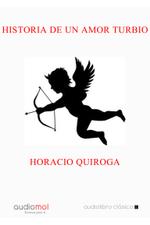
Historia de un amor turbio is the title of the first novel by Uruguayan author Horacio Quiroga. A haunting novel (like all Quiroga’s stories) that tells the love story between a man and two sisters. A young man, Rohán, flirts with both and it’s hard to know which one he really desires. This circumstance causes jealousy and uncomfortable situations that lead the reader towards an unpredictable end.
Who will be finally the chosen one? To discover it, you just need to have on hand your library card and your password.
Audiobook of the week / Audiolibro de la semana: La luz prodigiosa
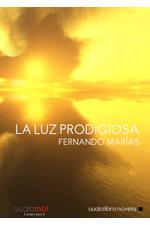 ¿Murió Federico García Lorca realmente en 1936? Esa es la pregunta que se hace el escritor Fernando Marías en su novela La luz prodigiosa, nuestro audiolibro de la semana.
¿Murió Federico García Lorca realmente en 1936? Esa es la pregunta que se hace el escritor Fernando Marías en su novela La luz prodigiosa, nuestro audiolibro de la semana.
Lo cierto es que jamás se encontraron sus restos, que sólo conocemos lo sucedido de forma fragmentaria y que aún faltan muchas piezas que juntar en el siniestro rompecabezas de su desaparición.
En La luz prodigiosa, la respuesta a esta pregunta va surgiendo, poco a poco, en boca de un viejo vagabundo y borracho, el mismo que hace cincuenta años encontró por casualidad a un joven moribundo tirado al borde de un camino y, sin conocer su identidad, le salvó la vida. ¿Qué fue a partir de entonces de aquel joven? ¿De qué manera sobrevivió a la guerra? ¿Por qué estos hechos quedaron olvidados hasta hoy?
La novela de Fernando Marías fue adaptada al cine en 2003 con notable éxito. Ahora, para escucharla, solo necesitas tu carné de biblioteca y tu contraseña.
Did Federico García Lorca die in 1936? That’s the question that Spanish writer Fernando Marías puts to us in his novel La luz prodigiosa, our audiobook of the week.
The truth is that his remains were never found. We only know what happened in a piecemeal and there are still many pieces missing in the puzzle of his sinister disappearance.
In La luz prodigiosa, the answer to this question emerges slowly from an old man, tramp and drunk. The same man that fifty years ago saved the live of a dying young man he discovered on the edge of a road, not even knowing his identity. What happened thereafter to that young man? How he survived the war? Why these facts were forgotten until today?
Fernando Marías‘s novel was adapted into a film in 2003 with remarkable success. Now, to listen to the audiobook version, you just need your library card and your password.
Concierto de Salvador Andrades en el Cervantes de Dublín / Salvador Andrades in concert
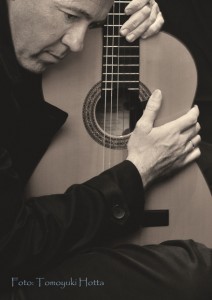 Salvador Andrades, guitarrista gaditano, alumno de Antonio Sánchez, padre de Paco de Lucía, ofrecerá un concierto en nuestro Café Literario el próximo día 18 de noviembre.
Salvador Andrades, guitarrista gaditano, alumno de Antonio Sánchez, padre de Paco de Lucía, ofrecerá un concierto en nuestro Café Literario el próximo día 18 de noviembre.
Salvador ha trabajado junto a artistas como Camarón de la Isla, Fosforito o Tomatito y ha participado como músico en varias películas, entre ellas The mask of Zorro bajo la dirección musical de James Horner.
En este concierto, Salvador Andrades interpretará sus propias composiciones, impregnadas de músicas como el jazz y la bossa nova. ¡Ya puedes comprar tu entrada en reservas.dublin@cervantes.es! Solo cuesta 10 euros.
Salvador Andrades, guitarist from Cadiz, will offer a unique concert in our Café Literario on the 18th November.
Salvador studied guitar with Antonio Sánchez, Paco de Lucia’s father. He has worked with artists such as Camarón de la Isla, Tomatito and Fosforito. As a musician, he has participated in several movies, including The Mask of Zorro, under the musical direction of James Horner.
In this concert, Salvador Andrades will play his own compositions, steeped in music like jazz and bossa nova. Now, you can buy your ticket at reservas.dublin@cervantes.es. It’s only 10 euros!
18/11 a las 7.30pm, Café Literario
Entradas: €10,
reservas.dublin@cervantes.es
¡Prepárate para Halloween! / Get ready for Halloween!
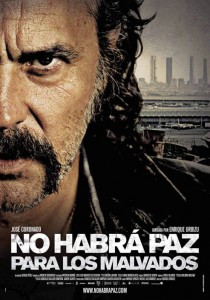 Apenas unos días antes de la llegada de Halloween, con sus sobresaltos y sus escalofríos, comienza el nuevo ciclo de cine en el Instituto Cervantes de Dublín, un ciclo que nos trae cinco de las últimas creaciones españolas de cine de terror y suspense.
Apenas unos días antes de la llegada de Halloween, con sus sobresaltos y sus escalofríos, comienza el nuevo ciclo de cine en el Instituto Cervantes de Dublín, un ciclo que nos trae cinco de las últimas creaciones españolas de cine de terror y suspense.
Mañana miércoles os presentamos No habrá paz para los malvados, película que recibió 6 premios Goya en 2011. En ella, su director, Enrique Urbizu, narra la historia de Santos Trinidad, un inspector de policía que un domingo cualquiera, de camino a casa, ya muy borracho, se ve involucrado en un triple asesinato.
La película comienza a las seis de la tarde. Venga, ¡prepárate para Halloween!
To get you in the mood for Halloween, Instituto Cervantes Dublin brings you 5 of the latest Spanish films in the thriller and horror genres, as part of a nail-biting new film season.
Tomorrow, Wednesday 23rd, we start this film series with No rest for the wicked, a film by Enrique Urbizu that won 6 Goya Awards in 2011.
Following the trail of a missing girl, Police Inspector Santos Trinidad gets involved in a shooting. The result: three dead bodies and a witness who manages to escape. Santos will get into hot water explaining the mess if he does not find the witness. The hunt begins… and our film screening starts at 6pm. Come on! Get ready for Halloween!
Preparando el Festival Isla 2014 / Preparing Isla Festival 2014
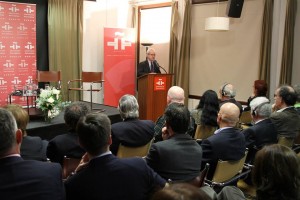 Durante este fin de semana, hemos celebrado la segunda edición del Festival Isla de Literatura. Por segundo año consecutivo, Irlanda, Latinoamérica y España se encontraron en el Instituto Cervantes de Dublín para hablar de la literatura y sus alrededores.
Durante este fin de semana, hemos celebrado la segunda edición del Festival Isla de Literatura. Por segundo año consecutivo, Irlanda, Latinoamérica y España se encontraron en el Instituto Cervantes de Dublín para hablar de la literatura y sus alrededores.
Una vez más, queremos agradecer desde aquí el apoyo y la colaboración de instituciones como Dublin UNESCO City of Literature, Ireland Literature Exchange, el Instituto Vasco Etxepare, Poetry Ireland, y cómo no, a la inestimable aportación de Dublin City University, National University of Ireland in Galway, National University of Ireland in Maynooth. Trinity College Dublin, y University College Cork. Muchísimas gracias a todos ellos.
Como dijera Rosa León, directora del Instituto Cervantes de Dublín durante su discurso de inauguración, «tenía que ser aquí, en esta isla esmeralda, donde naciera y creciera nuestro festival, donde la semilla de nuestro esfuerzo diera sus frutos. En esta misma tierra donde tantos genios de la literatura cavaron antes con su pluma para fecundarla y enriquecerla, para hacerla abierta, acogedora y libre.
Porque la gran riqueza de Irlanda es su cultura y su maravillosa tradición literaria, y esa poderosa fuerza se da la mano aquí, en este festival, con la fuerza del español, con quinientos millones de seres humanos en cuatro continentes, con la segunda lengua de comunicación a nivel internacional».
Rosa León recordó también las hermosas palabras del presidente Michael D. Higgins durante su discurso en 2012 y, como no, tuvo de palabras de cariño y reconocimiento hacia Seamus Heaney, cuya presencia estaba prevista en el festival desde antes del verano. Sus poemas, los mismos que él había elegido para su lectura durante el Festival Isla, se hicieron presentes en la sala gracias a la voz del actor irlandés Tom Hickey.
Finalmente, Rosa León cedió la palabra a otro gran amigo de Seamus y del propio Instituto Cervantes, el gran escritor irlandés John Banville, que «de forma amabilísima y desinteresadamente atendió la llamada del Instituto Cervantes para cubrir la ausencia de Seamus Heaney».
John Banville, en su intervención, recordó la impresión que le había causado, en su primera visita a España, un hombre a caballo en la isla de Mallorca. También recordó su visita a América del Sur para visitar la casa de la madre de Thomas Mann y nos hizo reflexionar, de este modo, sobre la universalidad de la literatura. Muchísimas gracias, John, por tu generosidad.
Esperamos que todos hayais disfrutado del Festival y esperamos también recibir vuestras sugerencias y aportaciones, para mejorar en lo que sea posible en la edición del Festival Isla de 2014 que hoy mismo comenzamos a preparar.
Las fotos del festival están ya disponibles en nuestra página de Facebook.
Los vídeos del Festival estarán muy pronto disponibles en nuestro canal de Youtube.
During last weekend , we celebrated the 2nd Isla Literary Festival . For the second year in a row , Ireland , Latin America and Spain joined at the Instituto Cervantes in Dublin to talk about literature and its surroundings.
Once again , we thank the support and collaboration of institutions such as Dublin UNESCO City of Literature, Ireland Literature Exchange , Instituto Vasco Etxepare, Poetry Ireland, and of course, the invaluable contribution of Dublin City University, National University of Ireland in Galway, National University of Ireland in Maynooth, Trinity College Dublin, and University College Cork. Many thanks to all of them.
As Rosa Leon, director of Instituto Cervantes in Dublin, said during her speech , “our Festival had to be born in here , in the Emeral Isle. On this same land where many geniuses of literature dug with their pens to fertilize and to enrich it , to make it an open land, free and welcoming.
Because the rich of Ireland is its culture and its wonderful literary tradition, and that powerful force joins hands here, in this festival, with the strength of the Spanish language, with half a billion of human beings on four continents , with the second language of international communication.”
Rosa Leon recalled as well the beautiful words of President Michael D. Higgins during his speech in 2012 and she had words of love and gratitude to Seamus Heaney, whose presence was expected at the Festival since before summer . His poems , the same poems he had chosen for reading during the Isla Festival, were present in the official opening thanks to the voice of the Irish actor Tom Hickey.
Finally , Rosa León gave the floor to another great friend of Seamus and Instituto Cervantes , the great Irish writer John Banville , who “so lovable and unselfishly answered our call to cover the absence of Seamus Heaney.”
John Banville recalled the impression that a man riding a horse in Mallorca made on him during his first visit to Spain. He also mentioned his trip to South America, to visit the house of Thomas Mann‘s mother and, in this way, he made us reflect on the universality of literature. Thank you , John , for your generosity .
We hope you all have enjoyed the Festival as much as we did, and we look forward to receiving your suggestions and contributions to improve, as best as we can, the 3rd edition of our Isla Festival that we start preparing today.
The photos of the Isla Festival 2013 are now available on our Facebook page .
The videos of the interviews we prepare will soon be available on our YouTube channel.
Te apuntas al Coro Cervantes? Would you like to join the Cervantes Choir?
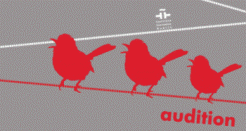 ¿ Te gusta cantar?, ¿conocer gente?, ¿practicar tu español a través de la música? Si tu respuesta es sí a alguna de esas preguntas, el Coro del Instituto Cervantes de Dublín puiede ser tu solución.
¿ Te gusta cantar?, ¿conocer gente?, ¿practicar tu español a través de la música? Si tu respuesta es sí a alguna de esas preguntas, el Coro del Instituto Cervantes de Dublín puiede ser tu solución.
Para formar parte del coro, no necesitas saber solfeo y tampoco es necesario pagar ningún tipo de inscripción. Lo único que necesitas es buen oído y buena disposición.
Para más información sobre su funcionamiento y sobre su director, Borja Zanón, escribenos a reservas.dublin@cervantes.es.
Do you like singing?, meeting people?, would you like to practice your Spanish through music? If your answer is yes to any of these questions, the Cervantes Choir may be a good chance for you.
To join the choir, you do not need to know music theory or to pay any fee. All you need is a good ear and good disposition.
For more information about how Cervantes Choir works and about its director, Borja Zanon, please write to reservas.dublin@cervantes.es.
